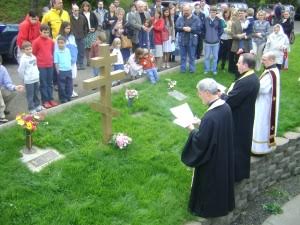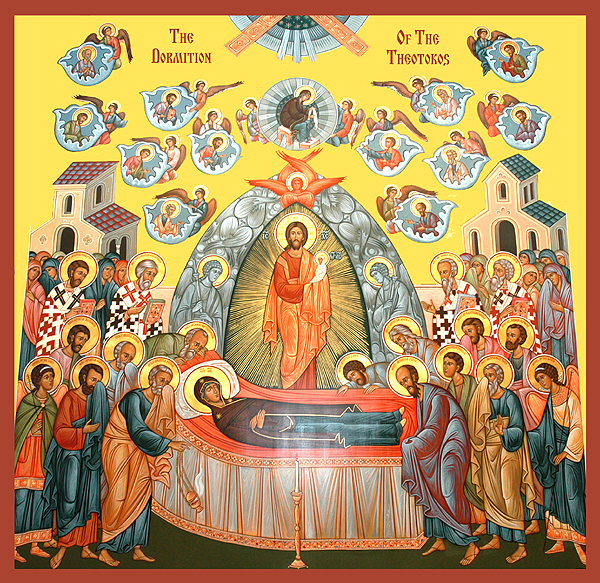Death
There is no person who will not die. The preparation for death is at the center of the spiritual life.

Lord, let me know my end, and what is the measure of my days; let me know how fleeting my life is! Behold, Thou hast made my days a few handbreadths, and my lifetime is as nothing in Thy sight. Surely every man stands as a mere breath! Surely man goes about as a shadow! Surely for nought are they in turmoil; man heaps up, and knows not who will gather! (Ps 39–4-6).
That man should die is not the will of God, for as the scripture says, “God did not make death.”
God did not make death, and takes no pleasure in the destruction of any living thing; He created all things that they might have being (Wisdom of Solomon 1.13).
For I have no pleasure in the death of anyone, says the Lord God; so turn and live (Ezek 18.32).
Death is the result of sin. It is the final victory of the devil, the result of his destructive activity. If man had not sinned, he would not have died. His body may have changed and evolved over great periods of time, but it would not have been separated from his spirit to return to the dust, and man’s soul itself would not have been corrupted, losing power over its body and becoming its slave. This is the meaning of the sin of Adam, that man has emerged on the face of the earth, made in God’s image and inspired with His Spirit, and has chosen death instead of life, evil instead of righteousness, and so through defilement of his nature in rebellion against God, brought corruption and death to the world (cf. Gen 3, Rom 5.12–21).
“Sin spread to all men because all men sinned” (Rom 5.12); and in sinning man brought death to the children who partake of this mortal nature and life. In a sin-bound world, no person escapes, even those who are personally guiltless and innocent, for all are caught up in the sins of the world.
Behold, I was brought forth in iniquity, and in sin did my mother conceive me (Ps 51.5).

Even the all-pure Virgin Mary who gave birth to Christ in the flesh could not escape the snares of death. For all her innocence and spiritual perfection, she too needed salvation from death by her Son, and her spirit rejoiced in God her Savior (cf. Lk 1.47).
According to the Orthodox Christian faith, Jesus Christ alone, of all men, as the incarnate Son and Word of God, need not have died. His death alone of all human deaths was perfectly voluntary. He came in order to die, and by His death to liberate all who were held captive by death’s power.
For this reason the Father loves Me, because I lay down My life that I may take it again. No one takes it from Me, but I lay it down of My own accord. I have the power to lay it down, and I have the power to take it again; this charge I have received from My Father (Jn 10.17–18).
Now is My soul troubled. And what shall I say? “Father, save Me from this hour?” No, for this purpose I have come to this hour.
Now is the judgment of the world, now shall the prince of the world be cast out; and I, when I am lifted up from the earth, will draw all men to Myself.
He said this to show by what death He was to die [i.e. crucifixion].
The crowd answered Him, “We have heard from the law that the Christ [i.e. Messiah] remains forever. How can you say that the Son of Man must be lifted up? Who is this Son of Man?”
Jesus said to them, “The light is with you for a little longer . . .” (Jn 12.27–35, cf. Mt 16.21–23, 17.9–13).
Jesus came “for us men and for our salvation” in order to die (Nicene Creed). He came that through His death and resurrection all men might be raised from the dead for eternal life in the Kingdom of God. This is the Christian faith.
. . . for the hour is coming when all who are in the graves will hear the voice of the Son of God, and come forth, for those who have done good, to the resurrection of life, and those who have done evil, to the resurrection of damnation (Jn 5.25–29).
This, too, is the apostle’s doctrine (cf. Acts 2.22–36).
But in fact Christ has been raised from the dead, the first fruits of those who have fallen asleep. For as by a man came death, by a man has come also the resurrection of the dead. For as in Adam all die, so also in Christ shall all be made alive. But each in his own order: Christ the first fruits, then at His coming those who belong to Christ. Then comes the end, when He delivers the kingdom to God the Father after destroying every rule and every authority and power. For He must reign until He has put all His enemies under His feet. The last enemy to be destroyed is death. (1 Cor 15.20–26).
For the trumpet will sound, and the dead will be raised imperishable, and we shall be changed. For this perishable nature must put on the imperishable, and this mortal nature must put on immortality. When the perishable puts on the imperishable, and the mortal puts on immortality, then shall come to pass the saying that is written: “Death is swallowed up in victory. O death, where is thy victory? O death, where is thy sting?”
The sting of death is sin, and the power of sin is the law. But thanks be to God, who gives us the victory through our Lord Jesus Christ (1 Cor 15.52–57).
The whole essence of the spiritual life is to die with Christ to the sins of this world and to pass through the experience of bodily death with Him in order to be raised up “on the last day” in the Kingdom of God (cf. Jn 6.39–44, 54).
By the power of Christ and the grace of the Holy Spirit, Christians can and must transform their deaths into acts of life. They must face the tragedy of death with faith in the Lord, and defeat the “last enemy—death” (1 Cor 15.26) by the power of their faith.
None of us lives to himself, and none of us dies to himself If we live, we live to the Lord, if we die, we die to the Lord, so whether we live or whether we die, we are the Lord’s. For to this end Christ died and lived again, that He might be Lord of both the dead and the living (Rom 14.8–9).
Truly, truly I say to you, he who hears My word and believes in Him who sent Me has eternal life; he does not come to judgment, but has passed from death to life (Jn 5.24, cf. Jn 6.29–58).
I am the resurrection and the life; he who believes in Me, though he die, yet shall he live, and whoever lives and believes in Me shall never die (Jn 11.25–26).
For Christians, as for all men, death remains a tragedy. When confronted by death, like all men, and like Jesus Himself and His apostles, Christians can only mourn and weep (cf. Jn 11.35, Mt 26.37–38, Mk 14.33–34, Lk 22.42–44, Acts 8.2). But for Christians, filled with faith in Christ and His Father, the tragedy of death can be transformed into victory.
